Pets typically don’t have the most discerning palates, and sometimes they may accidentally ingest a toxin, potentially experiencing serious health complications. Read our Guam Pet Hospital team’s guide to common pet toxins, and how you can reduce your furry pal’s toxin exposure risk.
Foods can be toxic to pets
Always keep in mind that many foods that are safe for people to consume may be harmful to pets. Do not share certain foods with your pet, because they can become dangerously ill.
- Common culprits — Many foods you regularly enjoy are toxic to pets. Do not feed your pet the following foods:
- Chocolate — Who doesn’t love chocolate? Unfortunately, this treat contains caffeine and theobromine, which cause cardiovascular and neurologic stimulant effects in pets. Signs include excessive panting, restlessness, increased heart rate, muscle tremors, and seizures.
- Grapes — Grapes and raisins are a healthy snack for humans, but they are toxic to pets. If your pet eats grapes or raisins, they can develop kidney failure.
- Sugar-free foods — Sugar-free foods, including mints and gums, may contain xylitol, which is extremely toxic to pets. This sugar substitute can cause severe hypoglycemia. Your pet’s signs may include weakness, incoordination, vomiting, and seizures.
- Onions — Vegetables, such as onions, garlic, leeks, chives, and shallots, contain compounds that cause oxidative damage to red blood cells, leading to anemia. Your pet’s initial signs include gastrointestinal (GI) upset, but as anemia progresses, signs include weakness, pale mucous membranes, and blood in the urine.
- Prevention tips — Although you may not put these toxic foods in your pet’s bowl, your furry pal can intentionally sniff them out or may inadvertently happen upon them. To prevent your pet from ingesting toxic foods, follow these tips:
-
- Store foods securely in latched cabinets or in airtight sealed containers.
- Keep your garbage in sealed containers to prevent dumpster diving.
- Read labels before offering your pet a new food to ensure no ingredients can negatively affect them.
- Don’t feed your pet table scraps.
- Ensure your guests know your pet isn’t allowed to eat human food.
- Pick up unattended plates and cups to ensure your pet doesn’t steal a bite or sneak a sip.
Medications can be toxic to pets
Any medication can be toxic to your pet. Never give your pet a medication intended for people.
- Common culprits — Oher-the-counter (OTC) and prescriptions medications intended for people can cause your pet a life-threatening condition. Common OTC and prescription medications that can be harmful to your pet include:
- Acetaminophen — People commonly take acetaminophen to alleviate headaches on other minor pains. Pets metabolize this drug differently than people. If your pet ingests acetaminophen, they can experience liver damage, and their red blood cells’ ability to carry oxygen can be inhibited. Cats are especially susceptible to acetaminophen toxicity.
- Ibuprofen — Ibuprofen is a non-steroidal anti-inflammatory drug (NSAID) that can cause GI ulceration and kidney failure.
- Blood pressure medications — Medications, such as angiotensin-converting-enzyme (ACE) inhibitors and beta-blockers, used to treat hypertension can be toxic to pets, causing issues such as excessively low blood pressure and heart rate, fluid accumulation in the lungs, and kidney damage.
- Attention deficit hyperactivity disorder (ADHD) drugs — ADHD drugs are stimulants, and when pets ingest these medications, their issues may include restlessness and a dangerous increase in their heart rate, blood pressure, and body temperature.
- Prevention tips — Whether you have OTC or prescription medications in your home or backpack, keep your pet from getting into them. To prevent your pet from ingesting these toxic medications, follow these tips:
-
- Store all medications, including OTC, prescription, and veterinary drugs, securely out of your pet’s reach—preferably on a high shelf behind a latched cabinet door.
- When taking your medication, ensure your pet is in another room, so they can’t swipe a pill if you drop it.
- Never give your pet medication intended for people.
- Never give your dog your cat’s medication, and vice versa.
Toads and frogs can be toxic to pets
Some frog and toad species, specifically Bufo toads, are extremely toxic. Your pet licking a toad or picking it up in their mouth is enough to cause serious intoxication and death. Because neurologic signs and seizures can develop in only a few minutes, you must act immediately if your pet comes in contact with a Bufo toad. Wash your pet’s mouth out with a hose or sink sprayer, aiming from the side of the mouth slightly forward so they don’t swallow the toxin-tainted water. Rinse their mouth for four to five minutes, switching sides every 15 seconds. After removing the toxin, call our hospital immediately so we can determine whether further action is needed.
Plants can be toxic to pets
Sometimes a pet goes too far in their appreciation of a plant’s beauty by nibbling a leaf or petal. However many plants are toxic to pets.
- Common culprits — Whether indoor or out in the yard, many plants can make your pet sick if your furry pal ingests them. Keep your pet away from these especially toxic plants:
- Lilies — All parts of the lily are dangerous, including the water used in a vase or that drains from the flowerpot. If your dog ingests a lily, they can experience GI upset. However, if your cat ingests a lily, they can experience severe kidney damage.
- Eucalyptus — Eucalyptus is commonly used in herbal products and essential oils, but the plant is toxic to pets, causing signs such as GI distress, tremors, and weakness.
- Lantana — Lantana is an invasive shrub found throughout Guam. All parts of the plant, especially the unripe berries, contain pentacyclic triterpenoids that cause pets to exhibit signs such as GI distress and lethargy. If your pet ingests lantana, they can also experience liver failure.
- Prevention tips — If you do not know whether a specific plant is toxic to pets, find out before bringing it home. To prevent your pet from ingesting toxic plants, follow these tips:
-
- Ensure all plants you bring home or plant in your yard are pet-safe.
- If you have a toxic plant in your yard, remove the plant or ensure your pet can’t access the area.
Household products can be toxic to pets
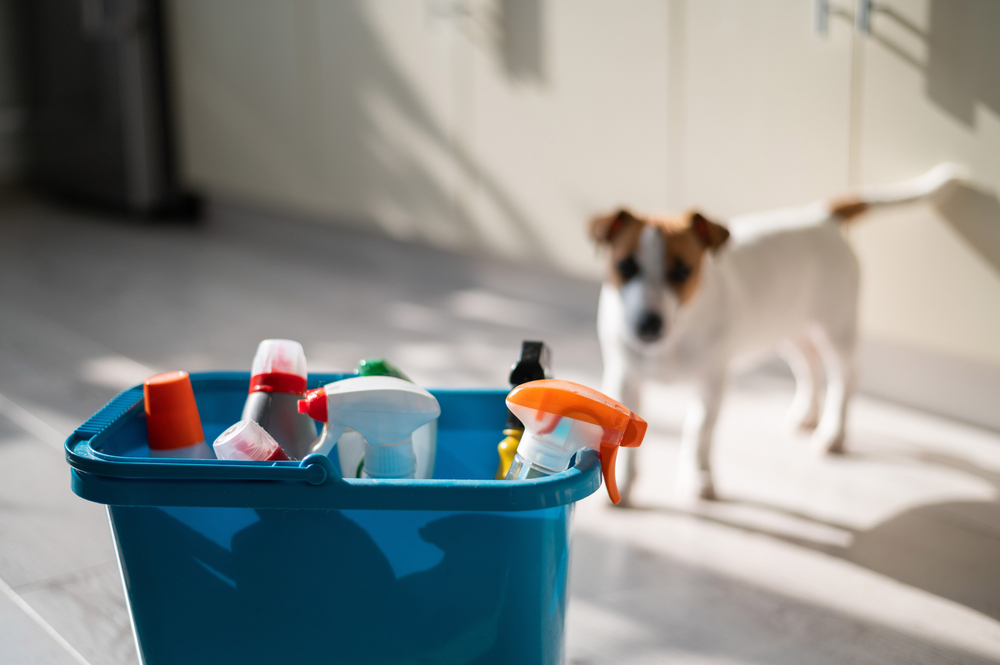
Your pet’s curious nature can often get them in trouble. Ensure that your pet cannot investigate dangerous household products.
- Common culprits — Many products you use around your home contain toxic chemicals. Keep you pet away from all household products, including:
- Rodenticides — Unless they are labeled as being pet-safe, rodenticides are dangerous to all pets. If you use rodenticide in your home or yard, block your pet’s access to the area, because these products are often made to be palatable to rodents, meaning your pet may also find them tasty.
- Cleaning products — Many cleaning products contain harsh chemicals, such as bleach, phenol, or ammonia, that can cause gastrointestinal (GI) irritation or toxicity.
- Adhesives — Glues and adhesives have a sticky texture that can be tempting to pets, but these chemicals can solidify in your pet’s GI tract, causing a life-threatening blockage.
- Antifreeze — Antifreeze commonly contains ethylene glycol, which has a sweet taste that appeals to pets. If ingested, this chemical can cause severe kidney failure.
- Prevention tips — Many household products include toxic chemicals. To prevent your pet from ingesting hazardous household products, follow these tips:
-
- If you use a rodenticide or other dangerous product, ensure your pet can’t access the area.
- Allow freshly cleaned surfaces to dry completely before allowing your pet access.
- Store all household products securely out of your pet’s reach.
To help prevent your pet from being poisoned, follow our tips to help reduce your pet’s toxin exposure risk. If you know or suspect your pet has ingested a toxin, contact our Guam Pet Hospital team so we can assess your furry pal’s health status and provide the care they need.


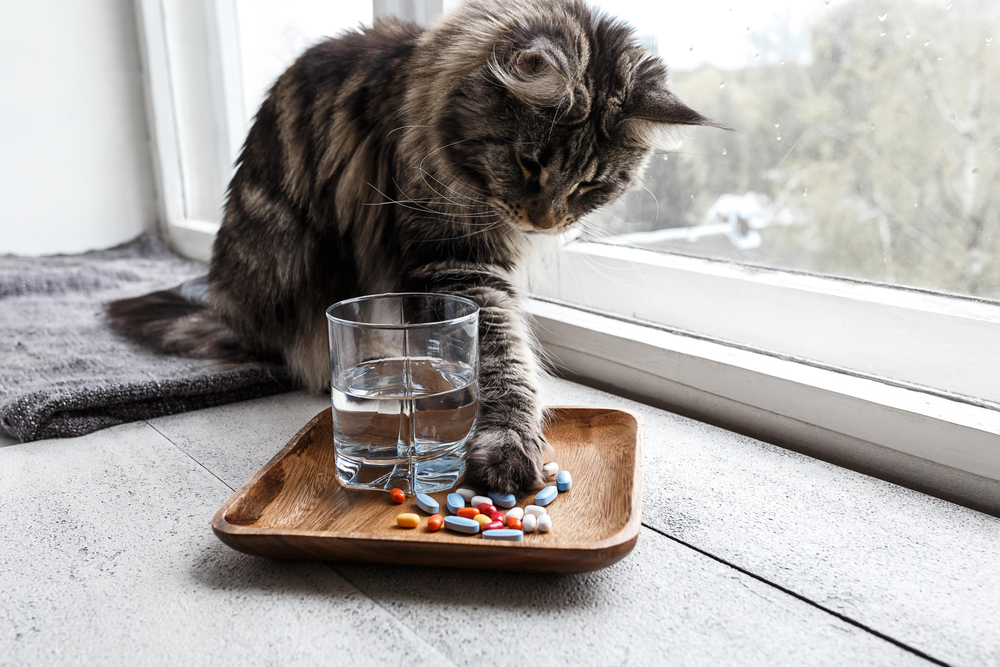
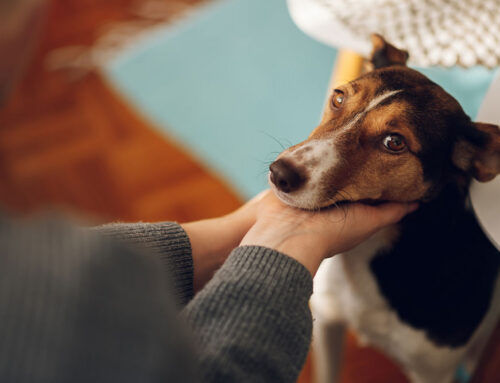

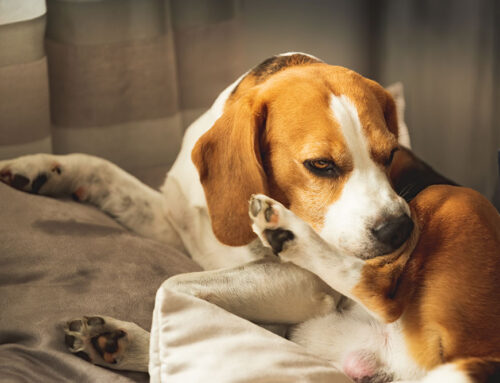
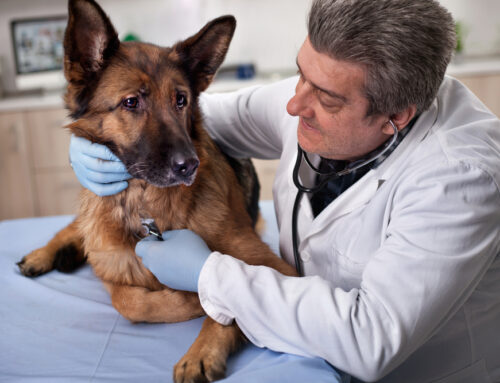

Leave A Comment